外研版(2019)选择性必修第三册Unit 6 Nature in Words Understanding ideas 课件(共44张PPT)
文档属性
| 名称 | 外研版(2019)选择性必修第三册Unit 6 Nature in Words Understanding ideas 课件(共44张PPT) | 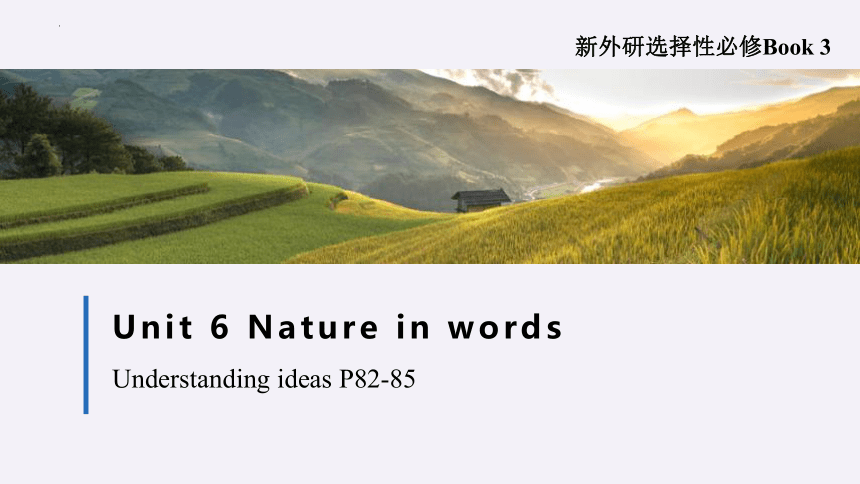 | |
| 格式 | pptx | ||
| 文件大小 | 11.1MB | ||
| 资源类型 | 教案 | ||
| 版本资源 | 外研版(2019) | ||
| 科目 | 英语 | ||
| 更新时间 | 2024-07-14 10:16:32 | ||
图片预览

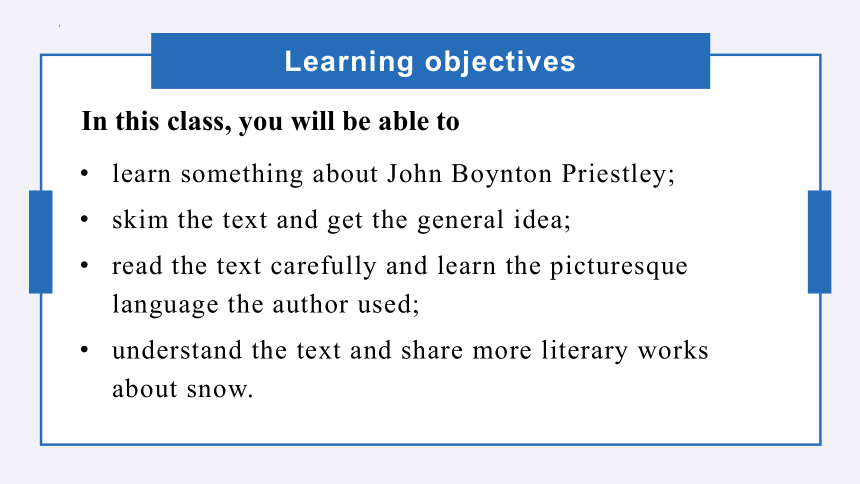
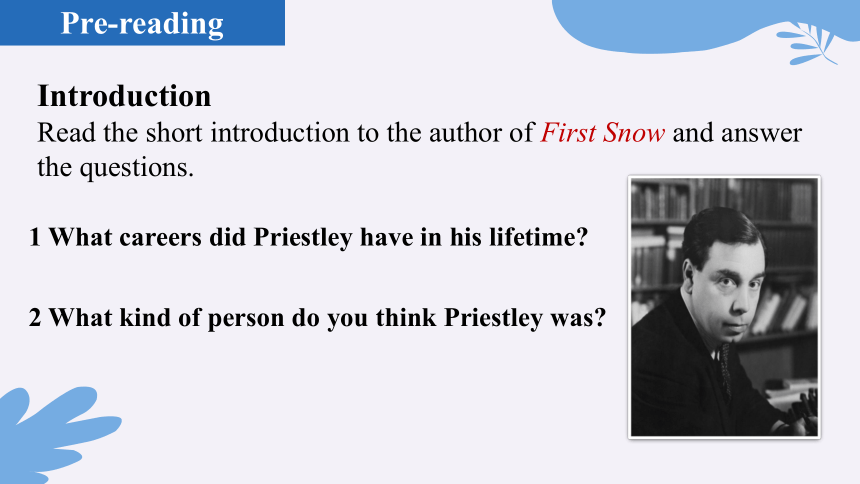
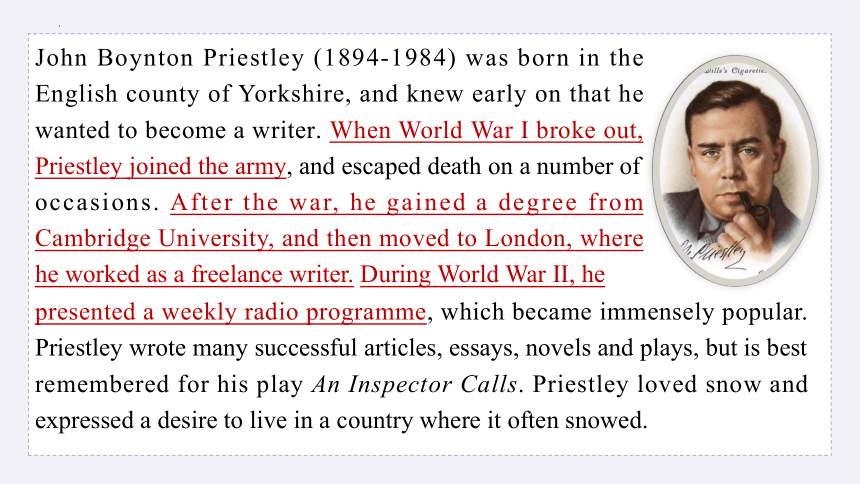
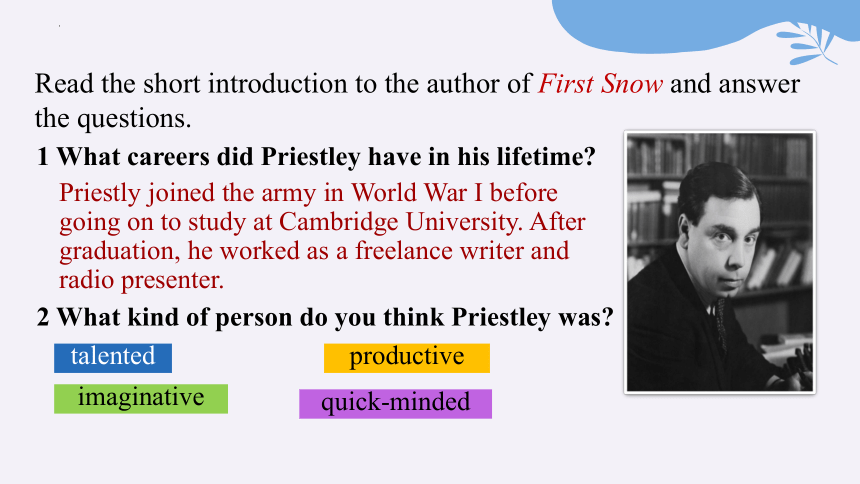
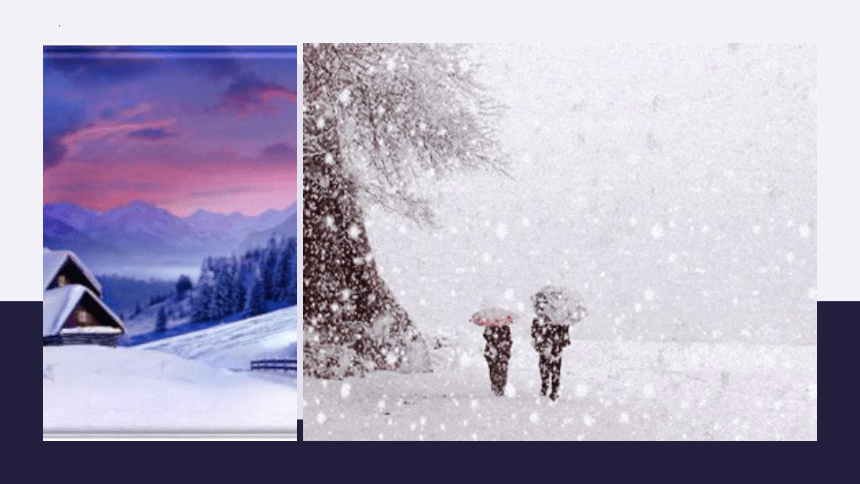
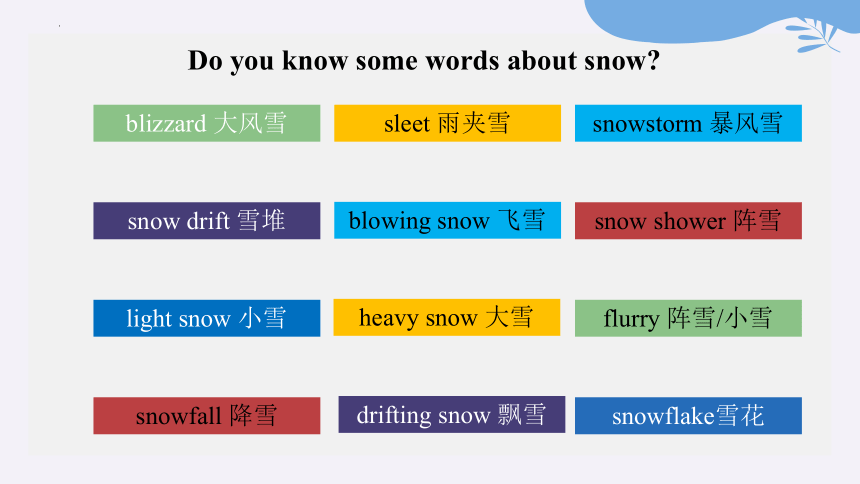
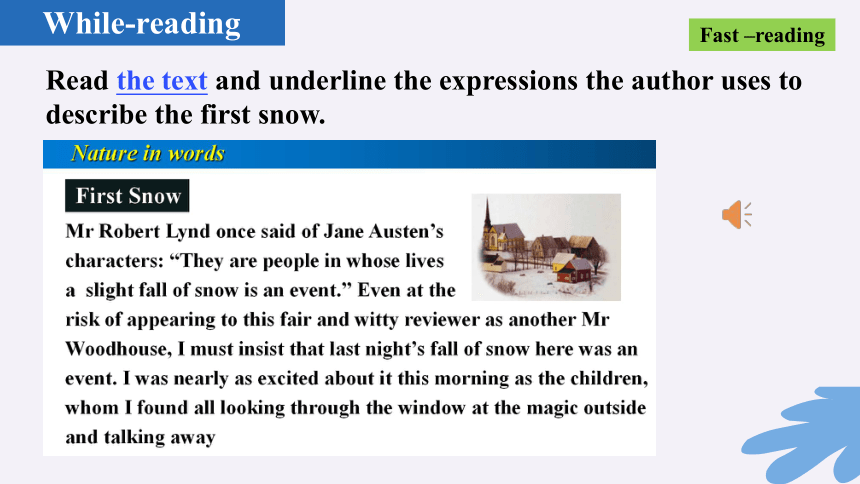
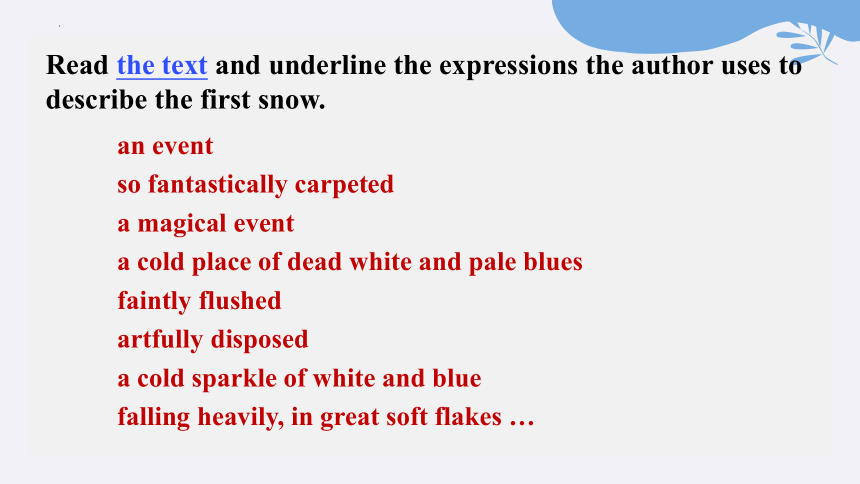
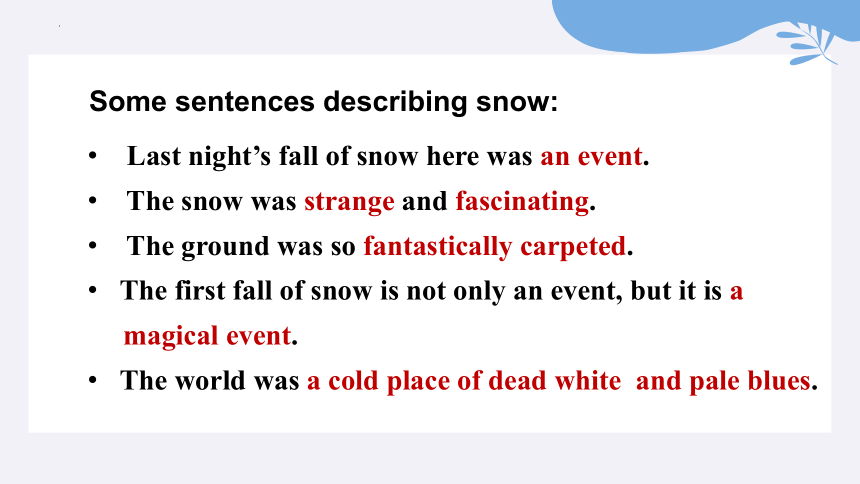
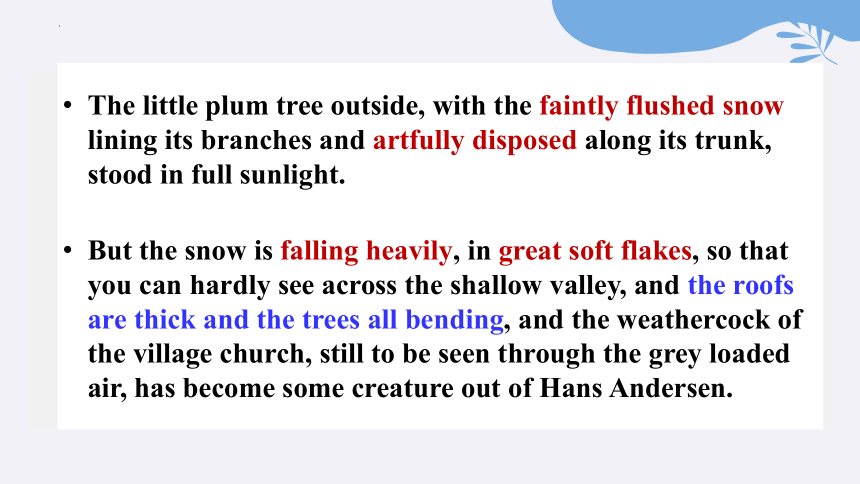
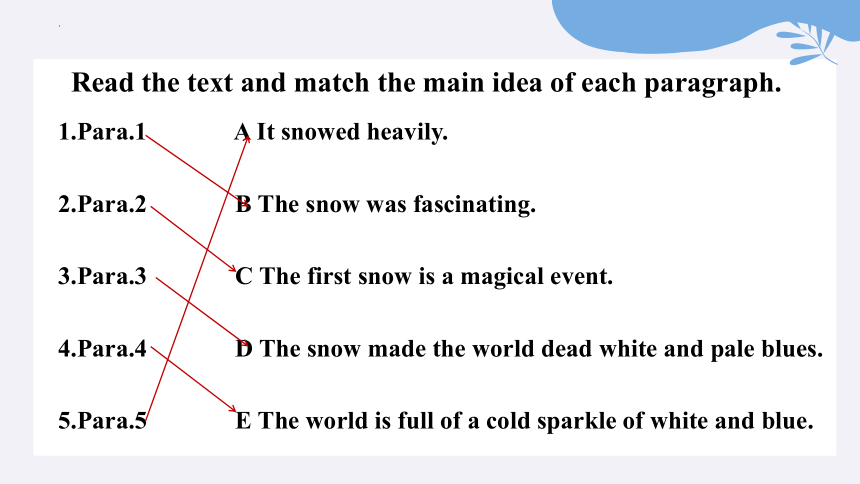
文档简介
(共44张PPT)
Unit 6 Nature in words
Understanding ideas P82-85
新外研选择性必修Book 3
Learning objectives
learn something about John Boynton Priestley;
skim the text and get the general idea;
read the text carefully and learn the picturesque language the author used;
understand the text and share more literary works about snow.
In this class, you will be able to
Introduction
Read the short introduction to the author of First Snow and answer the questions.
1 What careers did Priestley have in his lifetime
2 What kind of person do you think Priestley was
Pre-reading
John Boynton Priestley (1894-1984) was born in the English county of Yorkshire, and knew early on that he wanted to become a writer. When World War I broke out, Priestley joined the army, and escaped death on a number of occasions. After the war, he gained a degree from Cambridge University, and then moved to London, where he worked as a freelance writer. During World War II, he
presented a weekly radio programme, which became immensely popular. Priestley wrote many successful articles, essays, novels and plays, but is best remembered for his play An Inspector Calls. Priestley loved snow and expressed a desire to live in a country where it often snowed.
Read the short introduction to the author of First Snow and answer the questions.
1 What careers did Priestley have in his lifetime
2 What kind of person do you think Priestley was
Priestly joined the army in World War I before going on to study at Cambridge University. After graduation, he worked as a freelance writer and radio presenter.
talented
productive
imaginative
quick-minded
Do you know some words about snow
blizzard 大风雪
snowstorm 暴风雪
blowing snow 飞雪
sleet 雨夹雪
snow drift 雪堆
snow shower 阵雪
light snow 小雪
flurry 阵雪/小雪
heavy snow 大雪
drifting snow 飘雪
snowfall 降雪
snowflake雪花
Read the text and underline the expressions the author uses to describe the first snow.
While-reading
Fast –reading
an event
so fantastically carpeted
a magical event
a cold place of dead white and pale blues
faintly flushed
artfully disposed
a cold sparkle of white and blue
falling heavily, in great soft flakes …
Read the text and underline the expressions the author uses to describe the first snow.
Last night’s fall of snow here was an event.
The snow was strange and fascinating.
The ground was so fantastically carpeted.
The first fall of snow is not only an event, but it is a
magical event.
The world was a cold place of dead white and pale blues.
Some sentences describing snow:
The little plum tree outside, with the faintly flushed snow lining its branches and artfully disposed along its trunk, stood in full sunlight.
But the snow is falling heavily, in great soft flakes, so that you can hardly see across the shallow valley, and the roofs are thick and the trees all bending, and the weathercock of the village church, still to be seen through the grey loaded air, has become some creature out of Hans Andersen.
1.Para.1 A It snowed heavily.
2.Para.2 B The snow was fascinating.
3.Para.3 C The first snow is a magical event.
4.Para.4 D The snow made the world dead white and pale blues.
5.Para.5 E The world is full of a cold sparkle of white and blue.
Read the text and match the main idea of each paragraph.
Choose the author’s purpose in writing the passage and give your reasons.
1. By describing the magical scenery of the first snow, the author encourages readers to come to England and experience its beauty for themselves.
2. By depicting the beautiful near-magical scenery of the first snow, the author wants to convey his love for snow.
3. By recalling his memories as a child during the first snow, the author expresses his longing for the innocent happiest of childhood.
Read Para 1 carefully and answer the question.
Careful –reading
Mr Robert Lynd once said of Jane Austen’s characters: “They are people in whose lives a slight fall of snow is an event.” Even at the risk of appearing to this fair and witty reviewer as another Mr Woodhouse, I must insist that last night’s fall of snow here was an event. I was nearly as excited about it this morning as the children, whom I found all looking through the window at the magic outside and talking away as excitedly as if Christmas had suddenly come round again. The fact is, however, that the snow was as strange and fascinating to me as it was to them. It is the first fall we have had here this winter, and last year I was out of the country, sweating in a hot climate, during the snowy season, so that it really does seem an age since I saw the ground so fantastically carpeted.
Why did the author get excited at the fall of snow
Because he didn’t see a fall of snow for a long time.
Read Para 2 carefully and choose the right answer.
Careful –reading
The first fall of snow is not only an event but it is a magical event. You go to bed in one kind of world and wake up to find yourself in another quite different, and if this is not magic, then where is it to be found The very secrecy and quietness of the thing makes it more magical.
How did the writer find the first fall of snow here
B.Quiet.
C.Strange. D.Common.
A.Magical.
Read Para 3 carefully and answer the question.
Careful –reading
When I got up this morning the world was a cold place of dead white and pale blues. The light that came through the windows was very strange, and it made the familiar business of splashing and shaving and brushing and dressing very strange too. Then the sun came out, and by the time I had sat down to breakfast it was shining bravely and flushing the snow with delicate pinks. The dining-room window had been transformed into a lovely Japanese print. The little plum tree outside, with the faintly flushed snow lining its branches and artfully disposed along its trunk, stood in full sunlight.
What made the familiar business in the bathroom so strange
The light coming through the window.
Read Para 5 carefully and answer the question.
Careful –reading
Now it has changed again. The glare has gone and no touch of the disturbing remains. But the snow is falling heavily, in great soft flakes, so that you can hardly see across the shallow valley, and the roofs are thick and the trees all bending, and the weathercock of the village church, still to be seen through the grey loaded air, has become some creature out of Hans Andersen. From my study, which is apart from the house and faces it, I can see the children flattening their noses against the window, and there is running through my head a rhyme I used to repeat when I was a child and flattened my nose against the cold window to watch the falling snow:
Snow, snow faster:
White alabaster!
Killing geese in Scotland,
Sending feathers here!
What scene made the author recall a rhyme(儿歌)?
The scene that he saw the children flattening their noses against the window.
The structure of the passage
Para 1-2
introduction
First Snow
Para 3—5
description of the scenery of the snow
fascinating, excited
a magical event
When I got up this morning...
The sun came out...
An hour or two later...
Now...
time order
The author uses picturesque language to depict the first plete the diagram with the expressions you have underlined in the passage.
Timeline
When I got up this morning...
The sun came out...
An hour or two later...
Now...
Scenery
The world became a 1_______________________________. The light coming through the windows seemed quite strange, and it made the familiar business of splashing and shaving and brushing and dressing very strange too.
The snow became 2__________. My dining-room window changed into 3___________________. The little plum tree outside, with snow 4 ________
_________________________________, stood in full sunlight.
Everything was a 5________________________. The ground 6 __________, the sky was 7 ________, and all the trees 8___________________________
_________. The entire scene looked 9 ______________________________.
The snow is 10_______________________________________.
The roofs are 11_____________. The trees are 12____________________.
I can see the children flattening their noses against the window.
cold place of dead white and pale blues
delicate pinks
lovely Japanese print
lining its
branches and artfully disposed its trunk
cold sparkle of white and blue
went on and on
thick grey
so many black and threatening
shapes
like a cruel grassland
the snow is falling heavily, in great soft flakes
thick
all bending
1. Why does the author mention Jane Austen at the beginning of the passage
By referencing the characters of Jane Austen, who is known for her witty, perceptive observations of early 19th century English country life, the author is emphasizing the irony and self-awareness with which he goes on to make his statement about the first snow.
Post-reading
2. What images does the author use to enhance the description of snow
Images used by the author to enhance the description of snow: a cold place of dead white and pale blues, flushing the snow with delicate pinks, a cold sparkle of white and blue, falling heavily, in great soft flakes…
3. What other literary works about snow do you know Share them with the class.
The first snow
by Henry Wadsworth Longfellow
The first snow came. How beautiful it was, falling so silently all day long, all night long, on the mountains, on the meadows, on the roofs of the living, on the graves of the dead!
All white saved the river, that marked its course by a winding black line across the landscape; and the leafless trees, that against the leaden sky now revealed more fully the wonderful beauty and intricacies of their branches. What silence, too, came with the snow, and what seclusion!
Every sound was muffled, every noise changed to something soft and musical. No more tramping hoofs, no more rattling wheels! Only the chiming of sleigh-bells, beating as swift and merrily as the hearts of children.
4. Have you encountered any difficulties in understanding this passage Can you use visualization to better understand the passage
Visualizing text is a proven way to improve reading comprehension. A reader can purposely create mental images while and after reading. The images emerge from all five senses as well as the emotions, and are anchored in the reader’s prior knowledge.
Unit 6 Nature in words
新外研选择性必修Book 3
Language points P34-36
课文回顾:
After reading the passage,please fill in the following blanks.
Last night it snowed and it was the first fall of snow people 1._________ (see) that winter. Priestley found the children 2. (look) through the windows at the snow fall excitedly. However,last year he was abroad sweating in a hot climate during the 3. (snow) season. The first snow fall was not only 4.____ event but a magical event. People went to bed in one kind of world and woke up to find 5. (they) in another. This morning,when Priestley got up,the light 6. came through the windows made everything very strange.
had seen
looking
snowy
an
themselves
that
The dining-room window 7._______________ (transform) into a lovely Japanese print. An hour or two later,he looked out of the window and found the whole world 8.______________ (change) again. It was as if the kindly countryside had been turned into a cruel grassland.Then the world had changed again.The snow was falling so 9._____________ (heavy) that you could hardly see across the shallow valley. From his study,Priestley could see the children flattening their noses 10.______________ the window and recalled a rhyme in his childhood.
had been transformed
changed
heavily
against
1. Even at the risk of appearing to this fair and witty reviewer as another Mr. Woodhouse, I must insist that last night’s fall of snow here was an event.
即使冒着让自己看起来像伍德豪斯先生那样的风险,我也必须坚持说:“昨晚这儿下的那场雪是件大事”。
at the risk of doing sth. 冒着做某事的危险
eg. 他冒着生命危险救了我的命。
He saved my life _____ _____ _____ _____ ______ his own.
at the risk of losing
insist: v. to say firmly and often that something is true, especially when other people think it may not be true 坚称,坚决认为
insist (that)
eg Mike insisted that he was right. 迈克坚决认为自己是正确的。
insist: to demand that something should happen
坚持主张,要求
insist on (doing) sth. 坚持(做)某事
eg He insisted on checking everything himself. 他坚持自己检查一切。
We insist on the highest standards of cleanliness in the hotel.
我们坚持酒店最高标准的清洁。
【注意】
insist后面接that从句时,有两种情况:表示“坚持主张,坚决要求”时,从句用虚拟语气,即从句谓语用“should+动词原形”,should可以省略。表示“坚称,坚决认为”时,从句用陈述语气。
eg. She insisted that the man had stolen her wallet and that he
(should) be sent to the police station.
她坚持说那个人偷了她的钱包,并坚决要求把他送到警察局。
【语境应用】将下列句子翻译成英语。
1) 约翰坚持要我们收下这些礼物。
2) 女孩儿坚持认为是她哥哥错了。
3) 我坚决要求你立刻采取行动。
John insisted that we should accept these gifts.
The girl insisted that her brother was wrong.
I insist on your taking / insist that you take immediate action.
2. I was nearly as excited about it this morning as the children, whom I found all looking through the window at the magic outside and talking away as excitedly as if Christmas had suddenly come round again.
今天早上我和孩子们一样兴奋,我发现他们都透过窗户看着外面奇妙的世界,兴奋地说个不停,好像圣诞节又突然到来了。
eg They’re talking the long night hours away.
他们在漫漫长夜中交谈。
Nobody’s listening, but she just keeps talking away.
没人在听,但她一直说个不停。
talk away: to continue to talk for a long time 说个不停
come round: to happen often referring to a regulare event (指有规律的事情)来到; 发生
eg The summer holidays have come round again.
暑假又来了。
I’ve been saving for months, with the goal of buying a car by the time my next birthday comes around.
我已经攒了好几个月了,目标是在下一个生日到来时能买一辆车。
3. Then the sun came out, and by the time I had sat down to breakfast it was shinning bravely and flushing the snow with delicate pinks.
接着太阳出来了,等我坐下来吃早饭时,太阳的光彩已是绚烂夺目,给雪地添了一抹柔和的粉红色。
从句 主句
一般过去时 过去完成时
一般现在时(表将来) 一般将来时或将来完成时
by the time可用作连词,意为“到……时为止”,引导时间状语从句。
eg By the time I got to the station, the train had already gone.
You will not give up the drug by the time you become addicted to it.
By the time you get back, we will have finished the work.
【语境应用】
When I talked with my grandma on the phone, she sounded weak, but by the time we ________ up, her voice had been full of life.
A. were hanging B. had hung C. hung D. would hang
C
4. It was as if our kindly countryside, close to the very heart of England, had been turned into a cruel grassland.
就好像我们这个靠近英格兰中心的友好的小乡村,变成了一个暴躁的草原。
close to the very heart of England是插入语,修饰countryside,指出它的具体方位,即“靠近英格兰的中心”。这样的描写加强了气氛的渲染,使读者更加清楚地感受到countryside原本的样子。
as if (=as though) 仿佛,好像
可以引导方式状语从句,也可以置于look, seem, feel等系动词之后引导表语从句。
eg He talks to them as if they were children.
It seemed as if he didn’t care about everything around him.
在本句中,as if引导表语从句,从句内容不是真实的情况,
故用虚拟语气。
时间 从句谓语动词形式
现在 过去式(be动词用were)
过去 had+过去分词
将来 would/could/might+动词原形
eg She looks as if/though she were ten years younger.
The girl listened as if/though she had been turned into a stone.
He opened his mouth as if/though he would say something.
as if/though引导的从句中,常用虚拟语气表示所述的情况与事实不符:
【语境应用】翻译下列句子。
1) 亨利对他们很好,好像他们是他的父母。
_____________________________________________________
_____________________________________________________
2) 本不停地看表,好像在等什么人。
_____________________________________________________
_____________________________________________________
3) 看起来这趟火车不会按时到。
_____________________________________________________
Henry treats them very well as if they were his parents.
Ben watched his watch again and again as
if waiting for someone.
It looks as if the train won’t arrive on time.
5. …and the roofs are thick and the trees all bending …
屋顶上存了厚厚的雪,书目被压得弯下腰来……
bend: v. to become curved and no longer flat or straight 变弯曲
to move part of your body so that it is not straight or so that you are not upright(使)倾侧; 俯身;(使)弯曲
eg Bend your knees, but keep your back straight.
Lie flat and let your knees bend.
He bent the wire into the shape of a square.
I bent down to lift the box off the floor.
常见的含bend的短语:
bend your mind / efforts to sth. 致力于某事,专心致志于某事
bend the truth 扭曲事理,歪曲事实
bend the rules (for sb.) (对某人)放宽规定,通融
【语境应用】翻译下面句子。
1) She bent forward and whispered in my ear.
___________________________________________________________
2) I wasn’t exactly lying when I said I hadn’t seen her — I was just
bending the truth a little.
___________________________________________________________
___________________________________________________________
她往前倾身,在我耳边低语。
当我说我没看见她时,确切地说我并没有说谎,我只是稍微歪曲了一下事实。
Thank you!
Unit 6 Nature in words
Understanding ideas P82-85
新外研选择性必修Book 3
Learning objectives
learn something about John Boynton Priestley;
skim the text and get the general idea;
read the text carefully and learn the picturesque language the author used;
understand the text and share more literary works about snow.
In this class, you will be able to
Introduction
Read the short introduction to the author of First Snow and answer the questions.
1 What careers did Priestley have in his lifetime
2 What kind of person do you think Priestley was
Pre-reading
John Boynton Priestley (1894-1984) was born in the English county of Yorkshire, and knew early on that he wanted to become a writer. When World War I broke out, Priestley joined the army, and escaped death on a number of occasions. After the war, he gained a degree from Cambridge University, and then moved to London, where he worked as a freelance writer. During World War II, he
presented a weekly radio programme, which became immensely popular. Priestley wrote many successful articles, essays, novels and plays, but is best remembered for his play An Inspector Calls. Priestley loved snow and expressed a desire to live in a country where it often snowed.
Read the short introduction to the author of First Snow and answer the questions.
1 What careers did Priestley have in his lifetime
2 What kind of person do you think Priestley was
Priestly joined the army in World War I before going on to study at Cambridge University. After graduation, he worked as a freelance writer and radio presenter.
talented
productive
imaginative
quick-minded
Do you know some words about snow
blizzard 大风雪
snowstorm 暴风雪
blowing snow 飞雪
sleet 雨夹雪
snow drift 雪堆
snow shower 阵雪
light snow 小雪
flurry 阵雪/小雪
heavy snow 大雪
drifting snow 飘雪
snowfall 降雪
snowflake雪花
Read the text and underline the expressions the author uses to describe the first snow.
While-reading
Fast –reading
an event
so fantastically carpeted
a magical event
a cold place of dead white and pale blues
faintly flushed
artfully disposed
a cold sparkle of white and blue
falling heavily, in great soft flakes …
Read the text and underline the expressions the author uses to describe the first snow.
Last night’s fall of snow here was an event.
The snow was strange and fascinating.
The ground was so fantastically carpeted.
The first fall of snow is not only an event, but it is a
magical event.
The world was a cold place of dead white and pale blues.
Some sentences describing snow:
The little plum tree outside, with the faintly flushed snow lining its branches and artfully disposed along its trunk, stood in full sunlight.
But the snow is falling heavily, in great soft flakes, so that you can hardly see across the shallow valley, and the roofs are thick and the trees all bending, and the weathercock of the village church, still to be seen through the grey loaded air, has become some creature out of Hans Andersen.
1.Para.1 A It snowed heavily.
2.Para.2 B The snow was fascinating.
3.Para.3 C The first snow is a magical event.
4.Para.4 D The snow made the world dead white and pale blues.
5.Para.5 E The world is full of a cold sparkle of white and blue.
Read the text and match the main idea of each paragraph.
Choose the author’s purpose in writing the passage and give your reasons.
1. By describing the magical scenery of the first snow, the author encourages readers to come to England and experience its beauty for themselves.
2. By depicting the beautiful near-magical scenery of the first snow, the author wants to convey his love for snow.
3. By recalling his memories as a child during the first snow, the author expresses his longing for the innocent happiest of childhood.
Read Para 1 carefully and answer the question.
Careful –reading
Mr Robert Lynd once said of Jane Austen’s characters: “They are people in whose lives a slight fall of snow is an event.” Even at the risk of appearing to this fair and witty reviewer as another Mr Woodhouse, I must insist that last night’s fall of snow here was an event. I was nearly as excited about it this morning as the children, whom I found all looking through the window at the magic outside and talking away as excitedly as if Christmas had suddenly come round again. The fact is, however, that the snow was as strange and fascinating to me as it was to them. It is the first fall we have had here this winter, and last year I was out of the country, sweating in a hot climate, during the snowy season, so that it really does seem an age since I saw the ground so fantastically carpeted.
Why did the author get excited at the fall of snow
Because he didn’t see a fall of snow for a long time.
Read Para 2 carefully and choose the right answer.
Careful –reading
The first fall of snow is not only an event but it is a magical event. You go to bed in one kind of world and wake up to find yourself in another quite different, and if this is not magic, then where is it to be found The very secrecy and quietness of the thing makes it more magical.
How did the writer find the first fall of snow here
B.Quiet.
C.Strange. D.Common.
A.Magical.
Read Para 3 carefully and answer the question.
Careful –reading
When I got up this morning the world was a cold place of dead white and pale blues. The light that came through the windows was very strange, and it made the familiar business of splashing and shaving and brushing and dressing very strange too. Then the sun came out, and by the time I had sat down to breakfast it was shining bravely and flushing the snow with delicate pinks. The dining-room window had been transformed into a lovely Japanese print. The little plum tree outside, with the faintly flushed snow lining its branches and artfully disposed along its trunk, stood in full sunlight.
What made the familiar business in the bathroom so strange
The light coming through the window.
Read Para 5 carefully and answer the question.
Careful –reading
Now it has changed again. The glare has gone and no touch of the disturbing remains. But the snow is falling heavily, in great soft flakes, so that you can hardly see across the shallow valley, and the roofs are thick and the trees all bending, and the weathercock of the village church, still to be seen through the grey loaded air, has become some creature out of Hans Andersen. From my study, which is apart from the house and faces it, I can see the children flattening their noses against the window, and there is running through my head a rhyme I used to repeat when I was a child and flattened my nose against the cold window to watch the falling snow:
Snow, snow faster:
White alabaster!
Killing geese in Scotland,
Sending feathers here!
What scene made the author recall a rhyme(儿歌)?
The scene that he saw the children flattening their noses against the window.
The structure of the passage
Para 1-2
introduction
First Snow
Para 3—5
description of the scenery of the snow
fascinating, excited
a magical event
When I got up this morning...
The sun came out...
An hour or two later...
Now...
time order
The author uses picturesque language to depict the first plete the diagram with the expressions you have underlined in the passage.
Timeline
When I got up this morning...
The sun came out...
An hour or two later...
Now...
Scenery
The world became a 1_______________________________. The light coming through the windows seemed quite strange, and it made the familiar business of splashing and shaving and brushing and dressing very strange too.
The snow became 2__________. My dining-room window changed into 3___________________. The little plum tree outside, with snow 4 ________
_________________________________, stood in full sunlight.
Everything was a 5________________________. The ground 6 __________, the sky was 7 ________, and all the trees 8___________________________
_________. The entire scene looked 9 ______________________________.
The snow is 10_______________________________________.
The roofs are 11_____________. The trees are 12____________________.
I can see the children flattening their noses against the window.
cold place of dead white and pale blues
delicate pinks
lovely Japanese print
lining its
branches and artfully disposed its trunk
cold sparkle of white and blue
went on and on
thick grey
so many black and threatening
shapes
like a cruel grassland
the snow is falling heavily, in great soft flakes
thick
all bending
1. Why does the author mention Jane Austen at the beginning of the passage
By referencing the characters of Jane Austen, who is known for her witty, perceptive observations of early 19th century English country life, the author is emphasizing the irony and self-awareness with which he goes on to make his statement about the first snow.
Post-reading
2. What images does the author use to enhance the description of snow
Images used by the author to enhance the description of snow: a cold place of dead white and pale blues, flushing the snow with delicate pinks, a cold sparkle of white and blue, falling heavily, in great soft flakes…
3. What other literary works about snow do you know Share them with the class.
The first snow
by Henry Wadsworth Longfellow
The first snow came. How beautiful it was, falling so silently all day long, all night long, on the mountains, on the meadows, on the roofs of the living, on the graves of the dead!
All white saved the river, that marked its course by a winding black line across the landscape; and the leafless trees, that against the leaden sky now revealed more fully the wonderful beauty and intricacies of their branches. What silence, too, came with the snow, and what seclusion!
Every sound was muffled, every noise changed to something soft and musical. No more tramping hoofs, no more rattling wheels! Only the chiming of sleigh-bells, beating as swift and merrily as the hearts of children.
4. Have you encountered any difficulties in understanding this passage Can you use visualization to better understand the passage
Visualizing text is a proven way to improve reading comprehension. A reader can purposely create mental images while and after reading. The images emerge from all five senses as well as the emotions, and are anchored in the reader’s prior knowledge.
Unit 6 Nature in words
新外研选择性必修Book 3
Language points P34-36
课文回顾:
After reading the passage,please fill in the following blanks.
Last night it snowed and it was the first fall of snow people 1._________ (see) that winter. Priestley found the children 2. (look) through the windows at the snow fall excitedly. However,last year he was abroad sweating in a hot climate during the 3. (snow) season. The first snow fall was not only 4.____ event but a magical event. People went to bed in one kind of world and woke up to find 5. (they) in another. This morning,when Priestley got up,the light 6. came through the windows made everything very strange.
had seen
looking
snowy
an
themselves
that
The dining-room window 7._______________ (transform) into a lovely Japanese print. An hour or two later,he looked out of the window and found the whole world 8.______________ (change) again. It was as if the kindly countryside had been turned into a cruel grassland.Then the world had changed again.The snow was falling so 9._____________ (heavy) that you could hardly see across the shallow valley. From his study,Priestley could see the children flattening their noses 10.______________ the window and recalled a rhyme in his childhood.
had been transformed
changed
heavily
against
1. Even at the risk of appearing to this fair and witty reviewer as another Mr. Woodhouse, I must insist that last night’s fall of snow here was an event.
即使冒着让自己看起来像伍德豪斯先生那样的风险,我也必须坚持说:“昨晚这儿下的那场雪是件大事”。
at the risk of doing sth. 冒着做某事的危险
eg. 他冒着生命危险救了我的命。
He saved my life _____ _____ _____ _____ ______ his own.
at the risk of losing
insist: v. to say firmly and often that something is true, especially when other people think it may not be true 坚称,坚决认为
insist (that)
eg Mike insisted that he was right. 迈克坚决认为自己是正确的。
insist: to demand that something should happen
坚持主张,要求
insist on (doing) sth. 坚持(做)某事
eg He insisted on checking everything himself. 他坚持自己检查一切。
We insist on the highest standards of cleanliness in the hotel.
我们坚持酒店最高标准的清洁。
【注意】
insist后面接that从句时,有两种情况:表示“坚持主张,坚决要求”时,从句用虚拟语气,即从句谓语用“should+动词原形”,should可以省略。表示“坚称,坚决认为”时,从句用陈述语气。
eg. She insisted that the man had stolen her wallet and that he
(should) be sent to the police station.
她坚持说那个人偷了她的钱包,并坚决要求把他送到警察局。
【语境应用】将下列句子翻译成英语。
1) 约翰坚持要我们收下这些礼物。
2) 女孩儿坚持认为是她哥哥错了。
3) 我坚决要求你立刻采取行动。
John insisted that we should accept these gifts.
The girl insisted that her brother was wrong.
I insist on your taking / insist that you take immediate action.
2. I was nearly as excited about it this morning as the children, whom I found all looking through the window at the magic outside and talking away as excitedly as if Christmas had suddenly come round again.
今天早上我和孩子们一样兴奋,我发现他们都透过窗户看着外面奇妙的世界,兴奋地说个不停,好像圣诞节又突然到来了。
eg They’re talking the long night hours away.
他们在漫漫长夜中交谈。
Nobody’s listening, but she just keeps talking away.
没人在听,但她一直说个不停。
talk away: to continue to talk for a long time 说个不停
come round: to happen often referring to a regulare event (指有规律的事情)来到; 发生
eg The summer holidays have come round again.
暑假又来了。
I’ve been saving for months, with the goal of buying a car by the time my next birthday comes around.
我已经攒了好几个月了,目标是在下一个生日到来时能买一辆车。
3. Then the sun came out, and by the time I had sat down to breakfast it was shinning bravely and flushing the snow with delicate pinks.
接着太阳出来了,等我坐下来吃早饭时,太阳的光彩已是绚烂夺目,给雪地添了一抹柔和的粉红色。
从句 主句
一般过去时 过去完成时
一般现在时(表将来) 一般将来时或将来完成时
by the time可用作连词,意为“到……时为止”,引导时间状语从句。
eg By the time I got to the station, the train had already gone.
You will not give up the drug by the time you become addicted to it.
By the time you get back, we will have finished the work.
【语境应用】
When I talked with my grandma on the phone, she sounded weak, but by the time we ________ up, her voice had been full of life.
A. were hanging B. had hung C. hung D. would hang
C
4. It was as if our kindly countryside, close to the very heart of England, had been turned into a cruel grassland.
就好像我们这个靠近英格兰中心的友好的小乡村,变成了一个暴躁的草原。
close to the very heart of England是插入语,修饰countryside,指出它的具体方位,即“靠近英格兰的中心”。这样的描写加强了气氛的渲染,使读者更加清楚地感受到countryside原本的样子。
as if (=as though) 仿佛,好像
可以引导方式状语从句,也可以置于look, seem, feel等系动词之后引导表语从句。
eg He talks to them as if they were children.
It seemed as if he didn’t care about everything around him.
在本句中,as if引导表语从句,从句内容不是真实的情况,
故用虚拟语气。
时间 从句谓语动词形式
现在 过去式(be动词用were)
过去 had+过去分词
将来 would/could/might+动词原形
eg She looks as if/though she were ten years younger.
The girl listened as if/though she had been turned into a stone.
He opened his mouth as if/though he would say something.
as if/though引导的从句中,常用虚拟语气表示所述的情况与事实不符:
【语境应用】翻译下列句子。
1) 亨利对他们很好,好像他们是他的父母。
_____________________________________________________
_____________________________________________________
2) 本不停地看表,好像在等什么人。
_____________________________________________________
_____________________________________________________
3) 看起来这趟火车不会按时到。
_____________________________________________________
Henry treats them very well as if they were his parents.
Ben watched his watch again and again as
if waiting for someone.
It looks as if the train won’t arrive on time.
5. …and the roofs are thick and the trees all bending …
屋顶上存了厚厚的雪,书目被压得弯下腰来……
bend: v. to become curved and no longer flat or straight 变弯曲
to move part of your body so that it is not straight or so that you are not upright(使)倾侧; 俯身;(使)弯曲
eg Bend your knees, but keep your back straight.
Lie flat and let your knees bend.
He bent the wire into the shape of a square.
I bent down to lift the box off the floor.
常见的含bend的短语:
bend your mind / efforts to sth. 致力于某事,专心致志于某事
bend the truth 扭曲事理,歪曲事实
bend the rules (for sb.) (对某人)放宽规定,通融
【语境应用】翻译下面句子。
1) She bent forward and whispered in my ear.
___________________________________________________________
2) I wasn’t exactly lying when I said I hadn’t seen her — I was just
bending the truth a little.
___________________________________________________________
___________________________________________________________
她往前倾身,在我耳边低语。
当我说我没看见她时,确切地说我并没有说谎,我只是稍微歪曲了一下事实。
Thank you!
